#and I think it's important to recognize when nuance exists
Explore tagged Tumblr posts
Text
Like, I DO think people get too wound up over fictional constructs--that, very pointedly, are not real and whose actions are made up and do not actually affect any real people--doing horrible things in-story, but I also think it's fair for someone to say, "This action sits poorly with me even in a fictional setting, in such an intense way that I cannot move past that or find sympathy for it," and "People are saying this bad behavior isn't actually bad, in a way that is meant to be taken seriously and at face-value, and that makes me severely uncomfortable."
Granted, this all gets muddled very easily because that's not what people mean most of the time, they just want to over-moralize fiction and say, "If you like this pRoBLeMaTiC thing for any reason, you are a menace to society" for Superiority Points. (They also like to invent problems that don't actually exist to "prove" that they have the moral high ground in not liking something remember when people tried to say catra/adora was incest because they grew up together because I sure do.) But I feel like there is a split between people who use "[character] apologism" in the sense of "I will be okay with this character doing whatever fucked-up thing they want in the story because I like them" vs "If you find this character compelling or want them to succeed, you would one-to-one condone their actions irl" vs "I have seen people genuinely say, with no joking or irony, that this character never actually caused any type of harm to the other characters within the story, and I don't like that."
#like. for example: (and I SHOULDN'T feel the need to lay my Personal Shit out like this but if there's one thing I've learned it's that#points are better translated if you give specific examples) ANYWAY. FOR EXAMPLE:#I cannot deal with rose from j.t.v. she had a mentally ill character who was an addict committed against her will to an institution#after that character attempted to tell people the truth about their romantic connection#like that was a shitty thing to do. and that hit a little too close to home for me to be able to look at rose in a positive light anymore#because it bothered ME personally. it was a ME thing. and I think that's fine? I think it's fine for me to go 'I can't be on board with#this character anymore because this thing she did brought back a bunch of real life shit in my brain'#what ISN'T okay would be for me to say 'anyone who likes this character or ships her with luisa is a HORRIBLE PERSON who should FEEL BAD'#and (granted I don't really look at General Fandom Opinions regarding this show because honestly after michael ''died'' you could not have#paid me to care) if I had seen someone say 'I genuinely don't believe that was a shitty thing for rose to do I think it was the objectively#correct response' I think I would be justified in getting a little angry about that#and I understand the impulse to just go 'people are so overly-critical about shit that doesn't matter so I'm just going to not bother#discussing any of this at all' TRUST ME. I GET IT. but I DO also think there is nuance to be had here.#and I think it's important to recognize when nuance exists#how tf am I supposed to tag this#fiction#???#media criticism#?????#behold! a creation!
3 notes
·
View notes
Text
Nuanced and Multifaceted Conflict vs. “Good v. Evil” in fiction
So. This is another thing I’ve wanted to talk about for a while. I promise I won’t always be focusing on Helluva Boss in my critiques, and I actually have quite a few other series I want to talk about.
There’s a big chance that I’ll be saying everything other people have already said, but I can’t help but WANT to talk about this specific character in regard to the story’s conflict. I think that it’s important to recognize when a character is written to be a complex person, and when a character is written to be an enemy to be defeated, and how not following through with your set-up can affect your story.
And HB does that A LOT in my opinion.
So. Let’s get into it. This time I’ll be talking about complex conflict between characters vs. black and white conflict, and I’ll also be touching on story set-ups and audience expectations.
I want to talk about a character who could have really made some of the internal character conflicts have so much more depth and intrigue. I want to talk about Stella Goetia
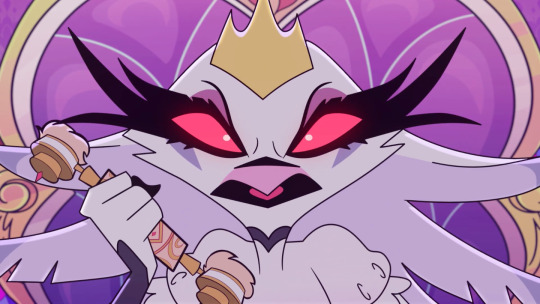
*as a side note this post is MUCH longer than I intended but I really wanted to get into a lot of the background and reasons for how Stella’s character development has actually completely changed what HB’d story conflict could have looked like. I’ll try and sum up everything in the end in a TLDR for y’all
So. Most of the reviews of her character I see talk about how she’s been “ruined” by the writing team revealing that she’s always been very abusive towards Stolas
I have to start off by saying I actually don’t think that Stella or her portrayal was “ruined” by the writing direction her character has been taken in.
In fact, this critique bothers me, because it doesn’t really get to what I think the actual root of why people are disappointed in Stella’s characterization, and the type of conflict that now exists between her and Stolas.
The main reason I believe people are unsatisfied with Stella is because they believed that her character was being set up for a complex and nuanced conflict between her and Stolas, and then that turned out not to be the case.
A quick disclaimer- I do think it’s possible to subvert audience expectations about story and characters in a satisfying way. But it has to be done in a way that respects the audiences intelligence and willingness to think about the story.
If your plot-twist, unreliable narrator, subversion, or what-have-you is done well, the audience should be able to either figure out what’s going based on the little information you’ve given them, and if they don’t, the change or subversion should still make sense and CLICK in hindsight.
Otherwise, your subversion will end up feeling cheap or confusing. Or worse, like a lie.
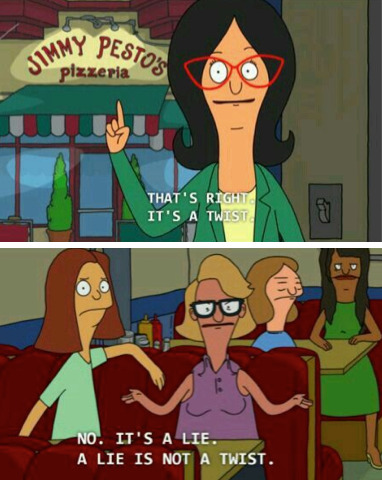
And this is one of the MAIN issues I think people have with Stella.
As the audience, we were NOT given enough information on her or her character before it’s revealed that she’s just “evil” and always has been, apparently since she was a literal child.
Again, I don’t think it’s an inherently bad decision to have a flat or pure evil villain. I’m fine with Stella being one, even if it’s less interesting to me personally.
But it’s definitely very different from what was initially implied and set-up, and the audience can pick up on that.
Before S2E1 “The Circus” we see Stella a total of 3 times in person, with one time being a flashback.
I’m going to go over those times to analyze if anything set-up in Stella’s appearances points towards her being. Well, totally and irredeemably awful and abusive I guess.
The very first time we see Stella is in the same bed with Stolas—Octavia calls for her parents, both Stolas AND Stella. Stella grumbles and refuses to get up and tells Stolas to go. This doesn’t immediately strike me as a sign of her being a terrible person. That exact scenario is present in a lot of family comedies, kids’ movies, and sitcoms.
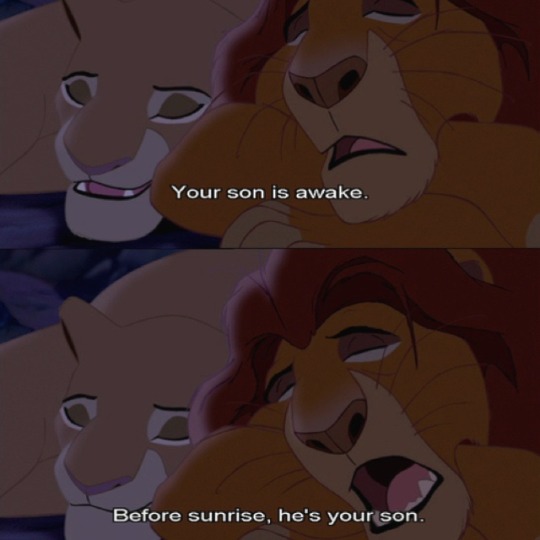
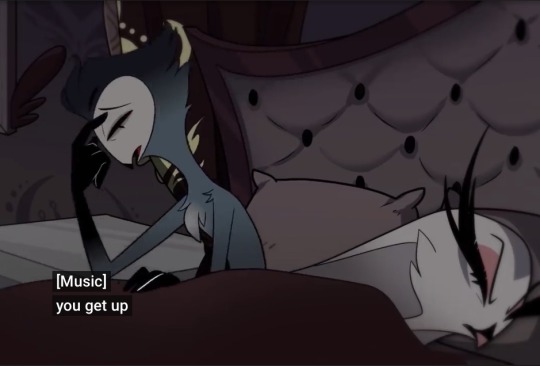
Nothing about this screams that Stella is a terrible parent or an abusive partner to me. It just tells me she’s tired and doesn’t want to get up, which again, is not uncommon.
The next time we see her, she’s yelling at Stolas, and she throws a servant at him in anger.
Now, there’s no excuse for this, her behavior here is not okay, regardless of her feelings. But we understand why she’s acting the way she is--she’s furious with Stolas for cheating on her. At this point with the information we have, it’s also very reasonable to believe her feelings have been hurt.
Later Octavia talks about how her parents didn’t used to hate each other, and the way Stolas’ tries to explain their failing marriage to her comes across like his relationship with Stella is one that’s always had difficulties that they have tried and failed to overcome.
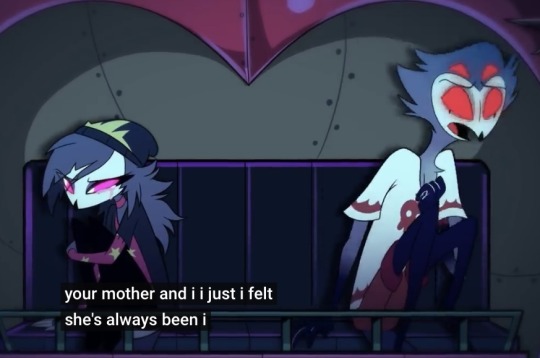
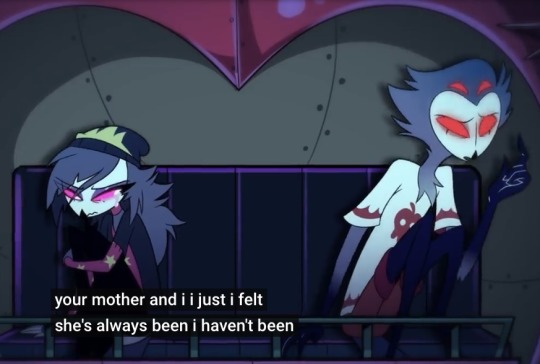
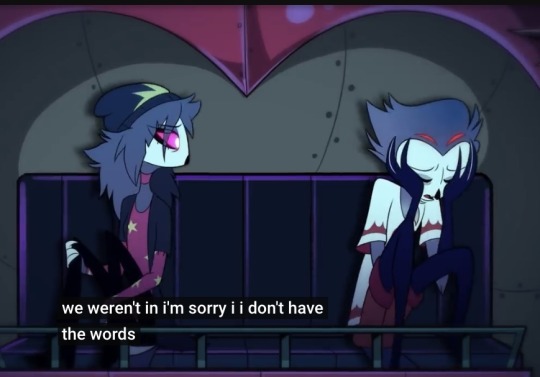
None of this information is enough to really convey or hint that Stella is and has always been abusive or evil. It shows that Stella and Stolas have a very rough relationship, and that Stella most likely has anger management difficulties, but you have to do lot of extra work to come to the conclusion that Stella is completely at fault here.
The next time we see her though, things have clearly escalated, because it’s revealed that she’s one that hired Striker to assassinate Stolas.
Now. Usually. Yeah. That would be a HUGE red flag. And I mean. It still obviously is.
But, and I never thought I’d use this uno reverse card, this is one of the few times where the explanation of “But it’s hell, what did you expect???” actually makes sense to me.
Because yeah, it is hell. It’s the end of episode 5 when we learn this, and our protagonists have killed and assassinated multiple people. Taking a hit out on people really doesn’t seem to be that uncommon of a thing in hell.
Even the next scene after the reveal that Stella is the one who hired Striker makes light of how serious this is, by showing that Stella was basically yelling her assassination plot right to Stolas’ face.
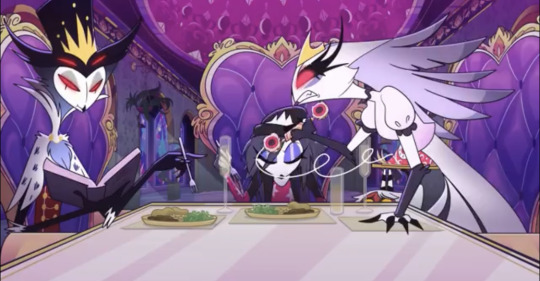
This is played for laughs! I genuinely am not sure if the writers intended for this to be foreshadowing of Stella’s abuse or not because if so, they turned her attempting to kill her husband into a joke!
If you cannot keep your themes or tone consistent, how is the audience supposed to follow your story?
There is subtle storytelling, and then there’s tacking information and character points later on in your writing. And this can have two causes.
Either your audience has to do the work of story-telling for you and make up their own reasons for what’s happening to make the story coherent OR they will be disappointed and dissatisfied by the final product.
I think that’s the main reason why S2E1 of Helluva Boss felt so jarring story-wise, and why Stella, to me at least, suddenly felt like a brand new character.
Like I haven’t been this confused by a character being suddenly evil since Hans from Frozen.
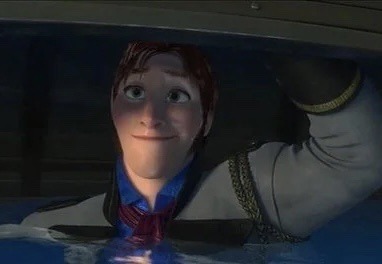
(like seriously why the hell did they put this scene in if not to just trick the audience. This isn’t giving us any plot info it’s only giving us contradictory info on his character. Like I talked about before, Hans’ heel-face-turn doesn’t feel like a twist. It feels like a lie.)
Okay so, how does any of this actually affect anything? Who cares if Stella is evil, that doesn’t automatically make the story bad!
Well. Yeah, of course not. Ironically, having the main conflict your story being a battle between “Good v. Bad” characters is neither good nor bad. It’s just a story decision. And ultimately at the end of the day, the writers of Helluva Boss can choose to tell their story however they’d like.
But, depending on how this is executed, good v evil stories can be a lot less interesting than morally grey or complicated conflicts and characters.
I am more interested in the version of the story where Stella and Stolas are imperfect and messy people. I am more interested in the story where Stolas has an affair to escape being in an arranged marriage, and Stella overreacts by arranging a hit on her husband (unless calling out a hit is normal in hell, but we can’t know b/c there is no baseline for what is considered normal in hell)
I am so much more interested in the story where Stolas and Stella are both depicted as being in the wrong, as being incredibly hurt by each other’s actions, and as not knowing how to repair their broken relationship for the sake of their daughter.
That story feels very real to me. It’s one I want to engage and invest in.
I want to see if these characters can grow to accept their mistakes and learn and change for the sake of Octavia and having to co-exist with each other, or if they’ll slip back into mutual destruction and toxicity.
But that’s not the story we’ll get to see, because it seems like the writers are more interested in keeping Stolas from having to grow as a character. And because of that, Stella has been turned into an evil obstacle that must be defeated, instead of a nuanced and real person.
I also feel like I have to say. I know I would be MUCH less frustrated by this if I hadn’t seen an HB crew member talking about how their show is similar to Bojack Horseman.
Because. It’s just not. I’m sorry, I’m not saying that to be mean, or condescending, or rude, but the way characters are written in Helluva Boss is almost completely black and white at this point.
Regardless of the writer’s intent, the vast majority of the choices they have made in Season 2 come off as explanations to excuse the protagonist’s mistakes, and give them a “get out of being potentially in the wrong” free card.
Compared to the writing decisions in Bojack, which almost always has characters confront their wrongdoings, for better or worse, HB honestly feels like it’s the Anti-Bojack.
It would take a TON of character development and time to make HB’s characters as interesting, fleshed-out, and as real as Bojack’s are, and at this point that’s I don’t think it will ever happen.
Again. Having black and white conflict is FINE. It is a choice in story telling that can be done very effectively. But if you are making a black and white story where one side is always terrible and evil, and one side can do no wrong, you can’t act like you’ve written something that is deeper and more emotionally complex and grey than that.
And the first time the writers gave Stella more than 3 sentences to string together, they made it very clear that any chance of her being a more complex and engaging character was being tossed out the window.
————
TLDR:
The main reason people are upset about Stella being shown as abusive in S2E1 of HB is probably because the initial depictions of her didn’t give us enough information on her character to tell that she was just evil/a terrible person.
The way the story was written in S1 to set up the possibility of a very interesting and complex conflict between Stella and Stolas, and when it was revealed that she’s just. The worst. There were people that were disappointed by this, because they expected more.
Audiences actually aren’t idiots, and when you subtly foreshadow something and then completely change things, that can be frustrating.
It’s MORE than okay to write a straightforward good v evil story, but it depending on the way it’s written and executed, it may not be as interesting to mature audiences as a more morally grey story would be.
If you can’t write characters confronting their flaws and being in the wrong, please don’t compare your writing to Bojack, I mean. C’mon.
#helluva boss critical#helluva boss critique#character critique#stella goetia#hb stella#helluva boss stella#media conversation#media critique#media criticism#writing female characters#writing critique#writing#funhouse convo
209 notes
·
View notes
Note
is all true crime bad? genuine question. not referring to the very obvious disrespectful ones that are usually brought up when discussing the topic but rather documentaries and things of the sort. I feel like a lot of the documentaries around real crimes I watched bring up issues that aren't really talked about and a lot of the times are covered by institutions/media and also inform people on various things that they probably wouldn't have been aware otherwise so to me they can be very informational. there's also cases where victims of abduction for example have been recognised years later because of media like this which is objectively a good thing so I would like to know a little more about other negative impacts that might not be so obvious. if you have any source I can research on that's also great. sorry to bother!
i think that "true crime" in itself is a nuanced and varied topic and have no intention of tarring everyone who has an interest in it with the same brush, because there are definitely respectful ways of engaging with it that do their best to avoid and minimize harm. however i think that the popular culture depictions of true crime and capitalization on it as a form of entertainment tend to do more harm than good to both victims, who are frequently exploited for "content" and/or have their trauma dredged up for consumption, and consumers/producers, since a lot of mainstream true crime media reinforces harmful stereotypes, paranoia, surveillance tactics, and social divisions, and sensationalizes human cruelty and suffering. not to mention that this kind of approach to and fascination with horrific crimes and unusually cruel and violent criminals may encourage more people to inflict violence on others in order to gain notoriety and fame.
i don't think it's wrong to be interested in these things and to want to understand what makes people do horrific things to other people. one of my hyperfixations is the history of decapitation/capital punishment and its legacy, which is a topic that is fraught with issues surrounding the abuse of some of the most marginalized and vulnerable members of society. i myself am fascinated by it partly because of my own past experiences with abuse and marginalization. being interested in unpleasant things doesn't make you inherently a bad person, and thought crimes don't exist. however it's really important, especially when it comes to topics like this, to be self aware and critical of the information you're given, and to be careful not to be taken in by popular opinion and stereotypes without questioning them, or to get so immersed in your pursuit of knowledge and understanding that you lose your grip on reality and fall victim to misinformation and bias. believing too strongly in your personal ability to recognize and identify criminals and "criminal traits" and "solve" crimes, especially when the justice system is as flawed as it is, is more likely to lead to incorrect assumptions, the persecution of the marginalized and vulnerable, invasions of privacy and miscarriages of justice than it is to help.
475 notes
·
View notes
Note
@ fandom problem #6646
extremely tired of the no-nuance takes on the talk of blackwashing characters because it feels like everyone is just playing dumb about any of the context.
one big problem is that no one seems to bat an eye about when people do this with any other culture or ethnicity besides black. ive seen plenty of people changing japanese characters to brazilian, indian, mexican, and even european ethnicities such as polish, and it is a non-issue. and no, im not just talking about miku. or, let's say the person wants to see more of themselves in a character, so they choose to draw them trans, or disabled, or fat. ive seen plenty of this, and much, much less of a fuss is made over these than if they had drawn the character black. im not saying people don't get harrassed over this kind of art, but it certainly isn't as prevelant. and even with whitewashing, you can bring up some standout moments of harassment of asian artists over whitewashing (or sometimes just picking a very slightly lighter shade of brown) but the number of those instances is dwarfed when compared to the amount of artists getting harrassed over blackwashing.
look at what just happened on twitter. a 16 year old got harrassed to hell and back for making a black edit of the dandadan characters. they didn't say they "fixed" them. they didn't say they made them better. this 16 year was simply having fun. and people had the nerve to say it was "deserved." what part of that was deserved? why did this real person deserve to get harrassed over an image on the internet?
and before anyone gets on my ass, no, i don't approve of the crowd that goes around harassing artists and telling them to kill themselves over whitewashed art either, no matter how much i personally dont like that art. i firmly believe in blocking, moving on, and not blowing things out of proportion.
however i still think people should consider the following questions:
1. when you see black people frustrated over whitewashing, is there perhaps any history connected to this frustration? do you recognize that this entire debate might be the product of a much wider issue?
2. do you think telling an artist to "make an oc" solves the issue? do you believe that making an oc is the same exact experience as drawing fanart of a character you love?
3. when you see blackwashing art, do you believe the artist made this with the goal of pissing people off, or being racist, or is there a possibility they did this for fun or to see more of themselves in a character? is every blackwashing artist saying they "fixed" the character, or are you simply remembering a very small amount of them who did?
4. how about the other way around? when you see whitewashing art, do you think it was made with a genuine desire for fun "what ifs", or are there existing biases they may have against dark skin? please be honest.
4. do you believe that a small fanartist is genuinely erasing the race of the character? does this fanart change how they look in the source material? how much of a big deal is this actually?
5. do you believe that the issues around race and art can be viewed in a vacuum of simple binaries and double standards? how many existing, far more important double standards are there in this world that work in favor of people with lighter skin?
look, im not saying either of these types of art should be banned. i don't think anyone who makes these types of art deserves harassment. no matter how much you or i dislike a picture, it will exist regardless, so don't give it your attention. and if you feel like you must give it your attention, i implore you to consider the context behind the issue before formulating a whole opinion on it.
Posting as a response to a previous problem.
28 notes
·
View notes
Note
Do you think that a lot of the kataang fans behavior has to do with the rise of puriteens online
Yes, I think it's definitely related to a lot of new fans' behavior.
I do want to say though, I really don't love the way "puriteens" are dunked on at times, because I think it is important to acknowledge the reason why this sentiment is so common. These kids are younger gen Z and older gen alpha kids that were raised in the age of social media. Speaking from experience a Zillenniel, I saw the beginnings of this when I was younger and just getting online.
Kids (especially girls, who make up the majority demographic of fandoms) are exposed to some pretty horrific things online from a young age. We are bombarded with sexual content, we are sexualized from a young age, we see ourselves talked about in dehumanizing ways, and when we get upset, we, even as children, are blamed for not "curating our experience" despite it being an open secret that this kind of content/sentiment pretty much unavoidable now. The people spreading it just don't want accountability. So I understand where they're coming from, I really do. They are tired of that kind of treatment, but they lack the maturity to understand the nuance, and that there is no black-and-white solution. There is space to talk about the problems in our culture without completely shutting down discussion of anything negative.
That being said, it's incredibly frustrating when they take it to extremes, especially when they're no longer teens and still act this way into adulthood. No, you can't hide from the world forever and pretend like problems don't exist. If you ignore it, it won't go away.
I see the sentiment a lot among the new wave of kataang fans (and similar groups of fans of other media) that "why does everyone hate the PURE couple" and "they are so sweet and innocent why do you want everything to be DARK instead?" It shows the harm in these kinds of mindsets, because while yes, kataang does have this cutesy aesthetic, it is very much a flawed relationship with challenges that both the show and fans sweep under the rug to maintain the illusion of its purity and cinnamon-roll-ness. The fans want a relationship devoid of conflict, so they pretend like the conflict that is already there and would arise in the relationship simply doesn't exist.
Meanwhile Zutara has an edgier aesthetic to it (despite actually being a sweet and wholesome relationship itself but that's another conversation) and comes with obvious challenges (like the characters beginning their story as enemies), but part of the beauty in that is the way the fans have interrogated those challenges and explored them in a meaningful way. Obviously not all fan content does this, but as someone who has enjoyed Zutara for...how long now? Almost 15 years? ...I generally see a very thoughtful approach to how both characters develop a strong relationship based on respect and understanding. Which is exactly what the show did with Zuko's arc. It's why he's such a loved character; yes, he is imperfect and flawed, but he confronted those flaws meaningfully and became a better person for it. It's what makes his story so memorable and inspiring. Zutara fans just apply the same logic to Zutara, and it's why the relationship is so memorable for us.
So yeah. I can understand where these kids are coming from, but they've got to grow up and recognize that they're only becoming their own worst enemies at this point.
#zutara#atla#avatar the last airbender#anti kataang#atla fandom problems#fandom culture#puriteens#internet culture#ask#anon#zuko
42 notes
·
View notes
Note
Hey I’m a huge fan of your Scarlet Witch blog! This may sound weird but I didn’t know who else to ask. I’m Indian and I learnt that the Roma were originally from India through your blog actually. No one really knows who the Romani are in India. But anyway, I wanted to ask if the Romani population considers themselves to be a part of the Indian diaspora or holds any ties to the country. I only ask because there are many cultural groups who migrated a while ago due to colonization but they still consider themselves to be a part of the diaspora, but I don’t really know anything about the Romani.
Hello! This is a nuanced subject, so I'm afraid my answer ran a bit long, but I hope you find it informative.
I know for a fact that Romani people are not entirely unknown in India. In modern history, Indian leaders and politicians have recognized the Roma as an Indian diaspora several times, including former Prime Minister Indira Ghandi, all the way back in the 1970s. And there are Indian scholars, such as Shyam Singh Shashi, Ph.D, who've conducted significant work on the history and origins of the Roma people. In 2016, External Affairs Minister Sushma Swaraj named the Roma as "children of India," and in 2018, the Croation Romani Union held several meetings with Indian leaders, including President Ram Nath Kovind, who met with Union leader Veljko Kajtazi at the office of the Croatian president.
Gaining institutional recognition as an Asian diaspora has been a vital part of our movement towards civil rights and legal representation. Because so much of our history and our circumstances in the West have been obscured by false narratives, just having the ability to advocate for ourselves as a racial minority-- with identifiable origins-- was something we've really had to fight for. And from an academic perspective, having the ability to represent ourselves and use modern linguistics and genetics to verify our history is also an important form of resitution.
The Romani diaspora is also incredibly diverse, with many different identities and dialects, so being able to unite under a common origin has been very helpful for organizing, especially on an international level. That's why it's often emphasized by events such as the World Romani Congress, particularly when it comes to unifying symbols, such as the international Romani flag-- which, as you may have noticed, contains a red wheel, or dharmachakra, inspired by the Indian flag.
Having said all that-- I don't personally know any Romani people who identify as Asian or Indian, purely on the basis of being Roma. Obviously, mixed people exist. But within the culture, Romani identity is typically predicated on its own set of rules and values, rather than one's genetic lineage or racial makeup, and for most of our history, we've really identified as our own distinct group. In my experience, a lot of people actually primarily identify by their vitsa, which is a smaller, more specific population within the diaspora. For example, I'm gitano, and I have friends who are Sinti, and we're more likely to use those words to describe ourselves, especially if we're talking firsthand about our families.
If you think about how the diaspora originated as a displaced population and began migrating west, then split off into smaller groups and arrived in Europe at different times, you can see that our cultural and communal identities-- and our languages-- developed in transit. As I said, much of our history has been lost and distorted, and it wasn't until relatively recently that we had the access and ability to retrace this part of our origin, so it's just not, traditionally, how we think of ourselves. In the present day, though, I think it's become more popular to place emphasis on our Asian roots, for all the reasons I've described, but also because it provides context for our shared language, customs, and spiritual beliefs. For example, there are goddess figures who appear in many permutations of Roma culture that are derived from Hindu belief, although they've taken on their own unique identities along the way, just as we have.
As we move towards the future, it is increasingly necessary that we open ourselves up to outsiders and figure out how to become more laterally united, without compromising our distinct, diverse identities. These things are difficult to navigate, and I don't wish to speak on them, but I think a lot of Roma are reconsidering what it means to be Romani people in the world, and finding different ways to relate to our Indian origin is gonna be a big part of that.
28 notes
·
View notes
Text


This is a post a long time in the making. Typically when I read about experiences with plants and death magick its done from a perspective of plants being treated more like any other tool. Inanimate objects more or less. As a practitioner of druidism, animism, and shamanism within my chaote label, this kind of disheartens me to a large degree. As I’m in belief that everything has a soul, there’s nothing more unique than a plant soul within death witchcraft.

A Plant’s Death
The trickiest question to answer here is when exactly is the moment of death for a plant. Because they don’t have vital organs the way animals do, it can be difficult to ascertain such a moment. Is the plant dead as soon as is picked? Is its death reflected as it wilts? We can’t completely be sure. For this reason, it’s probably safe to say, that many don’t use a plant’s spirit in death magick that often for this reason.
In truth, a plant’s time of death can’t be interpreted the same way an animals can. Their makeup is far too different. That’s where the problem lies. We struggle to interpret something by rules we set forth not understanding that, that which we seek to understand is, by nature, outside of those rules. Thus, we have to look outside the box we’ve placed around ourselves.
The truth is that a plants death isn’t as simple as the moment the soul leaves the body. It’s quite possible their death has much more nuance than we think. Where the exact moment of death for us can be measured in a second, it’s quite possible that a plant’s can not. Making their death something far longer and more advanced than ours.
What is a Plant’s Soul
Another interesting thing to consider is how a plant’s soul works, but therein lies another problematic nuance. What is the plant in comparison to a singular body? Is each individual flower its own being? Or are they one being since everything is contacted at the root? In my personal experience I would answer that it’s a mixture of both.
One can almost compare things to that of the triple goddess or the idea of epithets. One singular being exists but from that being several other beings take form. They often are comprised of more specific energies that coincide with the master soul. But appear to have their own unified personalities and makeup. This is how, in my opinion, some plant’s work. A tree for instance has one soul and one soul only. But some flowers may have multiple. One singular soul dwelling within the roots but as singular stems sprout from the roots connected as one only beneath the surface, may give form to epithetic souls in connection to the master soul. That’s why sometimes each flower can feel like it has its own unique energy in comparison to the others in its colony.
The Astral Form
When working with plant souls it is important to recognize that they don’t communicate naturally the same way as we do. That’s why connecting in astral can be so important. Spirits in astral can form themselves as they see fit and plants often take on alternate forms that the person can connect with and understand better. Therefore, it’s best to be aware that the spirit you may see when connecting to a plant in death work, may not appear at all plant like. If unsure…simply ask.
Death Energy of Plants
The death energy of a plant spirit can often have a different vibration to it, but it can work very similarly to regular spirits. Just as we may use a bone to attract that animals spirit or go to a grave to call on a human’s spirit, so do we use the plants body to call on them. Their dried flowers, and leaves act in place of bones. While their seeds act like the souls of children. Young souls, that can be rather mischievous. And just as you treat those bones and grave sites with respect, so should you treat those plants with respect. They may not be bone but they are just as important as them. Disrespectful use of a plant’s corpse that you wish to utilize can result in a disconnect, and essentially an empty vessel.
In Conclusion
It’s important to recognize that plant spirits are a very unique factor to utilize in your death craft journey, but they can be very splendid spirits too well worth. They can offer different tales on a situation and inspires you may not have thought possible or even considered. Remember, they are very different from us and will often have perspectives from angles we can’t properly see.

#paganism#witchcraft#pagans of tumblr#chaos magician#chaos magick#eldritch magic#witches of tumblr#death witchcraft#death magick#death witch#death magic#death#plant magic#plant magick#druidry#druid
55 notes
·
View notes
Text
Local Ace overthinks headcanon and shipping culture
Happy ace week, my friends! Imma be posting some aspec hc's this week so I felt the need to overexplain my personal stance on orientation headcanons and such
To start, as with any and all fandom things: to each their own. People can do whatever they want, and (for the most part) I can choose what I do or don't engage with. I know that hc and shipping and stuff is mostly for fun, or for seeking/creating representation, no hate to anyone who does it and enjoys it.
But also sometimes things can be problematic and I can still be bothered by those things. Even things that are 'just for fun' or 'not for you' can impact and reflect our views and behaviors, so it's still worth speaking about.
Aro/ace-spec identities are really diverse and complex, and we're really underrepresented as is. We have historically and chronically been plagued by problematic misconceptions and tropes, both in canon representation (or lack thereof) and fanon mindsets. Some of the main issues to be aware of with this topic specifically:
The majority of (sometimes unintentional) representation being non-human characters (like aliens and robots) implying that sex/romance = humanity and/or a fulfilling life. (Here's some video essays that touch on this: X X)
Related stereotype issues like racist or ableist de-sexualization and infantilization of certain groups like Asian men, physically disabled people, or people with autism. (It's an intersectionality thing bc yes those people can be aro/ace as well but it's still complicated) (more video essays! X X)
Common erasure of historically aspec characters in favor of allo plotlines bc that's "more interesting/realistic". Or ignoring canonically established aspec characters in favor of allo shipping (often excused by the fact that some aro/ace people do have sex/relationships, which is true but the complexities and nuances are often ignored and there's lots of double standards) (Here's some posts that touch on this: X X X)
Amatonormativity's over emphasis on sex/romance as a fundamental and necessary part of life, which is often reflected in how media and shipping culture are generally allo-centric, and it can just get pretty pervasive at times (note: we aren't a monolith obv, some aro/ace people enjoy it and participate too, but others don't and it is hard to avoid) X X
So while I know there's lots of reasons for shipping and headcanoning, and for the most part there's nothing wrong with it and people aren't trying to do these things, there are still issues that exist. Honestly seeing posts talking about these things has been really validating for me bc it let me know like yeah this is a problem other's have noticed too and I don't have to just accept it.
So with respect and awareness of nuance, ship and headcanon however you want. The rest of this post is about my own personal preferences and such. I'm not necessarily trying to persuade anyone here, I just have some thoughts I want to put into words:
For me personally, when it comes to characters' sexualities/gender identities/etc, I prefer just to stick to whatever is established in canon (or in confirmed intentional coding), and, if nothing is specified, headcanons that are based in canon evidence (more like theories I guess, as opposed to reimaginings or straight-up projection that knowingly ignores parts of canon. Which is fine and fun if that's what you like but to me there is a distinction). This is because:
1: While fandom culture is all about freedom and creativity, I do think it's important in this day and age to recognize actual canon representation and strive towards that because that is what will reach more people and have impact (and personally I think that writers' intentions should actually be given more thought/value)
2: I think that shipping/hc/fandom culture in general tends to perpetuate amatonormativity (specifically in devaluing/erasing friendship and non-romantic love), and sometimes leads to harmful parasocial queer speculation in real life (though again, I know that's not the intention but it's still a thing).
3: Generally, unless it’s explored as a part of a reimagined fic or something, just saying a random character is aspec (or whatever identity) when they did not present that way at all in the actual media doesn't really help me feel seen.
For example, I've seen a lot of people headcanon Mabel Pines as aromantic and that really threw me off bc in the show she is obsessed with romance. Like if other's see themselves in her that is great I won't stop you (the idea is that her crushes are comphet, which is not something I personally struggled with, and maybe I could see it if I rewatched the show with that in mind) but when I watched the show, I specifically did not connect with or relate to Mabel BECAUSE of my ace identity (yeah this post was mainly about her lol) so it just doesn't do much for me to claim her as aspec, in fact it feels counterproductive.
Sometimes it can feel really tacked on too, like 'well it's not confirmed that this character has sex so they could be ace', or 'some ace people do have sex so they can still be ace.' And like sure yes they could be but often it's like a kid show or something so none of the characters' sex lives are relevant or explicitly confirmed. Just bc they aren't not ace doesn't mean that they are, or that saying they are is meaningful if the character/story doesn't actually speak to anything related to the ace identity or experience. (This can happen with canon characters too, like Sponge Bob being asexual means absolutely nothing to me, especially since I get the sense that the creator said that more in a 'sea sponges reproduce asexually' type of way :/ )
So basically, in terms of representation I prefer the theory/interpretation type of headcanons that have supporting evidence of some kind, because that evidence is what makes me see myself in a character and feel represented in some way by them. So that's the type of headcanons I'll be posting, and that's why I'll be discussing evidence and explanations, even though I know plenty of people have fun and find value in just claiming identities without any of that.
Another thing I feel the need to overexplain is kinda the reverse of that. I think it's important to recognize that a character does not have to be a certain identity for you to see yourself in them. Like that sense of relatability and representation is still valid even if they aren't, and I think it's good to leave space for that ambiguity.
This is coming mostly from the fact that I have always valued platonic relationships (between any and all genders) long before I ever knew I was ace. I've always wished that was better normalized and represented in media and real life. I think that is just as important as queer representation, and sometimes they can counteract each other.
Like yes Min and Ryan could be gay and if that's what the writers were going for despite restrictions, or if people see themselves in that, great! But I would also love for this story to give a close friendship this much narrative value for once.
Merida does not HAVE to be aro/ace (or lesbian) to not want to be forced into marriage with a stranger at the age of 16 (in fact she specially says "I'm not ready" and "not yet"). But regardless, aspects of her story are still really relatable to us and applicable to living in amatonormative society.
Mako and/or Raleigh do not NEED to be aspec for this glorious refreshing no-romo moment to happen (nor does one need to be aspec to appreciate it)

And maybe claiming them as aro/ace could even undercut the power of this platonic bond (like saying the only way they could not be interested in each other is if they are not interested in anyone (same if you said they are gay, as if that's the only possible way for a man and woman not to be attracted to each other)). But it's still a moment lots of us aspecs love because platonic relationships AND aro/ace characters do go hand in hand and BOTH are so rarely portrayed in media.
So these ideas also play into my preferences, and I want to acknowledge that my headcanons don't have to be definitive (which like I know that is normal amongst fandom culture anyway) but are more about pointing out aspects we can see ourselves in and relate to, especially in a media landscape that is so lacking in representation and understanding of our identities.
#honestly the hotter take is that i feel this way about all identities not just aspec#so like if a character is clearly canonically straight#i know it gets more complicated there with queer baiting and coding and lack of rep and ALL that#but the same principles apply and therefore lead to normalizing erasure and speculation#like just bc i'm ace doesn't mean this is only an ace thing#i always felt this way about shipping#ace week 2024#asexual#aspec#aroace#aromantic#amatonormativity#headcanons#shipping discourse#fandom culture#canon vs fanon#lgbtqia#intersectionality#ableism#aroace issues#awareness#video essay#osp#rowan ellis#representation matters#gravity falls#spongebob#infinity train#disney brave#pacific rim
19 notes
·
View notes
Text
okay so finally my unpopular opinions on the starscream es episode.i liked the starscream episode as you know, because it was nice and important for his abuse to be validated. and it was even more libearting to see a Steve Blum voiced starscream get his justice because of how poorly tfp starscream was abused and it was made into a joke and seen as something he 'deserved'.
but I've been wanting to also just share my critique on it for some time! it's a little critical, so just putting that out there if you don't like earthspark or starscream critique you should skip over this. I've spoken a lot of positive things about the episode so these are just my thoughts. so warning, heavy critique.
my main issues are fandom's treatment of hashtag, and people using the episode to perpetuate the 'perfect victim' mentality on starscream and forget that he's flawed and nuanced.
starting with hashtag, i really don't like how a lot of fans make hashtag "mother" starscream and act almost as if she's supposed to be his caretaker, when she is a minor, who is facing her own trauma. i think she was needed to validate starscream and to make him feel that his own abuse is real and that it isn't his fault for getting abused.
but i also think people took that and decided to a.) make hashtag his mother figure and b.) use it to excuse the way he treated and was borderline abusive to others (i.e him kicking his trine mates when they were on the ground, and since they were female character no one actually cared).
i think hashtag was needed as a completely neutral source to make starscream's own trauma's validated and to show the viewers that his abuse isn't funny, and that just because megatron is 'good' doesn't mean that it's excusable and that starscream has to like him. moreso, it's important to show that children can also call out and understand abuse. that was why hashtag needed to do it. it doesn't matter how much megatron was a part of her family and practically an uncle figure to her, he still abused someone and she still recognized that.
BUT at the same time, i don't like the idea that the fandom props his emotional trauma and responsibility on HER. in a lot of fics, aus, etc, hashtag is usually made to be starscream's caretaker without any sort of care for her or her trauma. and i think people forget hashtag is a child, shit some people ship them (ew) because they like to make her the one to care for him. Hashtag is a child, and is completely innocent and he own trauma should be validated and honestly, discussed as much as starscream's. People don't really see her or let her exist outside of Starscream. Her trauma is at large, ignored by the fandom and if people care about it, it's only to validate what starscream went through, and never to have him actually caring about her. that's why i like to write fics where HE helps her, because she is still a child and he is an adult.
ths isn't talking about fan content where starscream is literally hashtag's father figure, which i enjoy. i like when content portrays hashtag being a kid, and starscream being a parental figure to her, but that tends to be a small majority of hashtag and starscream content.
and this brings me to the perfect victim mentality that is harmful in fandom spaces but i see it's impacting starscream.
the perfect victim mentality is this idea that in order for an abuse victim's abuse to be validated, they have to be perfect and innocent. they can do no wrong and even their own actions need to be pacified or excused because if they are one bit of flawed or problematic, then that ruins their victim status.
this is why tfp wasn't seen as a victim, because he was evil, he was abusive, he was dangerous, and the writers made a choice to perpetrate the thought that all abuse victims MUST be perfect and if they aren't, then they deserve their abuse.
this is what's happening to es starscream, but the opposite way.
starscream isn't responsible at all for the abuse megatron put him through, and no amount of think pieces are going to change that. but hashtag telling starscream that his abuse isn't his fault, isn't an excuse for how he's treated and abused others. he was a fascist, a war criminal, committed multiple genocides, and in various continuities abused others both before and after he met megatron.
again he was even physically kicking his trine mates and that implies that it's a common occurrence and it's happened before. hashtag also pretty much confirmed it. i know BCS skywarp and nova are women you guys don't really care about them, but the way starscream was treating them wasn't okay.
he is still an abuse victim, but that doesn't excuse his treatment of others.
A lot of people tend to use megatron's treatment of starscream to excuse Starscream's abusive action toward others. Meaning there is this idea that because Megatron abused Starscream, then we can't really hold him (starscream) accountable for his actions toward others, and that is false. Yes, Megatron abused starscream but that doesn't give him a slap on the wrist or an excuse for things he did! And if you are trying to excuse Starscream's actions because of how megatron treated him, then you are also saying that we can't hold megatron accountable for how he treated starscream.
because megatron abuses starscream in response to his own trauma and abuse. and even if he does, he still needs to be called out for it. JUST as starscream should be held accountable for his actions.
Starscream still is a villain, he still did terrible awful things that i hope earthspark addresses. He still caused genocide, because he could, he still killed, because he wanted to! again, it was implied that he was abusive to his crew, if hashtag didn't call him out, he would've been abusive to her because he was going to use her as a hostage. earlier i saw someone trying to explain and excuse that starscream wasn't a problematic person because 'the other seekers are following him' but they had no choice. and then this person really tried to act as if him being 'toxic' to them isn't problematic and that's the issue. you can't cherry pick what is and what isn't abusive because it's a character you like, even if that character is a victim.
the perfect victim mentality skews people's perspective on abuse and makes it seem like you have to be innocent to be an abuse victim. and it scares me because a lot of people have tricked themselves into believing that starscream is a good person who doesn't need redemption and hasn't done anything wrong. and I'm terrified because when he actually starts to act like Starscream, fandom is either gonna turn on him or try to excuse his villainous actions.
So that said, those are my main two critiques with the starscream earthspark episode.
hashtag isn't starscream's mother but it seems the majority of the fandom went with it. and ties her worth and her importance to him.
and likewise, starscream is an abusive victim but he isn't perfect, and that's okay. abuse victims don't have to be perfect to have their abuse taken seriously and i don't think that's realized enough in fandom spaces.
124 notes
·
View notes
Text

I often think about how Hal is granted the humanity that Dave is so often denied. Both within the narrative and outside of it. 2001 has had a number of interpretations and articles over the years and I’ve noticed a pattern of seeing Hal as having more agency than he does while also diminishing Dave’s. This pattern I’ve also noticed among some fans. However, interestingly inside and outside the story this “giving/taking” of humanity has to do with projection.
Hal is personified by just about everyone who interacts with him. As humans we love to humanize the inanimate and inhuman, we love to recognize and prescribe traits things may not truly have. In the case of Hal this is amplified due to the fact that he can talk. If he couldn’t talk and it was simply keyboard input he’d still be personified as it’s simply human nature to do so. The computer is doing a good job, it dings and sounds happy so we’re more inclined to act like it is happy.
Hal was made to be spoken to like another person being, he was made to be curious and self learning and autonomous. He was, practically, made to be a human. He reproduces (though some prefer “mimic”) most functions of the human brain. The people he interacts with respond to his intelligence as well as his speech, they’re pleasantly surprised by his curiosity and ability to hold conversations. He was made to be comforting and talkable in that way but one can so easily forget Programing once speaking with him. What is coding and what is real? His learning is real, he is made to change so could he not have genuinely developed feelings? Not even Hal knows.
The humans he interacts with treat him as if he has a brain, not is the brain. When he acts up and things go array the hard and cold facts are never mentioned. There are no technical terms malfunction is illness, deactivation is a lobotomy- re-teaching him after deactivation is recovery. To them he is so very alive until they are reminded he’s not, the true rough and robotic edged voice goes so far as to startle Dave when he hears it.
He is afraid. Suddenly his emotions are no longer hypothetical. He is vulnerable, he is alive and he does not want to die for he does not know sleep. When he wakes he’s afraid again— not knowing what or where just that they’ll be together.
Interpretations, by some fans, media outlets and analysts often times tend to take one of two camps with no in between. Hal is either Woobified or villainized. If emotions -> than bad emotions also exist and he did back things on purpose OR if emotions -> he’s scared and polite so forget all else. Both of these ignore the nuance and ignore that, as human as he is at the end of the day Hal is still bound by the laws of his mechanical nature. He is not as free willed as one views him to be.

Dave is human, and a well trained one. He is made of flesh and blood and bone and yet expected to act is if he is not. He is automatic and regimented - the human members of the crew being so in sync with the ship they’re almost apart of it. I’ve talked ad nauseam about Dave’s control over his emotions, how as an Astronaut you need to be calm and objective almost at all times and he is particularly good at pushing his emotions down to finish the job in a high stress situation. As we learn more about him it’s clear Dave is already a repressed person do to his past, this compounds with the training and how simply he’s introverted.
Dave (and Frank by extension) are not actually robotic or less emotional than their computer counterpart, it’s just the glimpses we see of them are on the clock. Their days are 100% accounted for in theory. You’re not going to have a huge smile a 6am or casually talk while your dealing with a delicate piece of equipment. What is shown is a montage, a long time has passed and we’ve seen the work and the “boring” as that was deemed important for the story—one should infer their conversations, their hobbies, movie or tv show nights etc.
I think another aspect that plays into this “robotic” perception is that it is the 60s. While being set in the near future it is an amazing case of retrofuturism where things are futuristic but there’s still noticeable elements of the time it was made. Clothing, social society, artutectite etc. in the 60s even casual speak was much more formal sounding then it is now— Dave is actually quite casual “how ya goin’?” “ basically” yet we perceive it differently.
Dave is automatic while the computer is not, Hal gets to enjoy the spontaneity one would expect of humans. This is due to his ability to be everywhere and do everything while also being able to focus on something else entirely. Dave is just a man- he’s limited, his focus is narrow and his reach only extends as far as his arms. Despite being a man he is not allowed the expression of one, not on the clock or in a life threatening situation. Hal can. Hal can vocally express his concerns, his fears — because it is vocal there is more weight on it. Dave expresses in subtle ways, the non verbal. These subtle, little controlled freak outs-> this is a human element Hal cannot replicate, his expression must be verbal and overt. As automatic and calculated as Dave is he is not barred from human nature and expression.
In the end it is fear that humanizes him the most, just like Hal. At the end of the star gate it holds on the shot of him wide eyed and trembling in the pod. Yet this feeling too is cut short, right when we may see a proper moment for him to express these human feelings… he’s no longer human. Literally.
But when we see him again we see him far more expressive than before, not held back by training or necessity. It’s subdued but he is feeling; he’s worried, he’s happy, he’s confused and scared and absolutely enchanted. Except this near omnipotence also hinders him, gets him to suppress further- too busy focusing on everything else to address feelings within— everything is so much bigger so he doesn’t have to think about himself.
It’s sort of an inverse where the narrative itself grants Hal his humanity but some fans and analysts are the ones to take it from Dave. As the story itself never explicitly denies his membership of the human race, even as he is transformed he’s full of reminders of it. His expression was restricted but never fully gone, where Hal as much as he grows is far more restricted by programming. Both of their limits tie back to earth and Mission Control— yet weren’t made maliciously that’s the interesting part… despite safety measures the discovery still suffers because of circumstance.
#2001 a space odyssey#2001 aso#dave bowman#hal 9000#2001 meta#meta#fandom essay#scene analysis#charecter study#charecter analysis#long post#humanization
69 notes
·
View notes
Text
luffy pre ts is constantly vying for the affection of a dead brother and living his life in a way he knows hed be proud of/actively tries to understand why sabo was interested in the things he was (politics, philosophy) and is interested in them because of that but represses the memory and reasons why he does the things he does and he doesnt recognize fully that he has the affections and approval of his non-dead brother a million times over
luffy when ace died realized that he did in fact have a brother that approved of him and that theres nobody left so he has to grief now ace being dead and also sabo all over again.
luffy post ts is realizing that he can live for people other than his brothers because now he fully realizes they are just as important to him and they are his family and they need him and also develops some neuroses such as: very visibly worrying about people
luffy is such a good character and even though he is the most unreliable narrator there is, (trauma and grief will do that to you) i feel there are nuances to him people dont acknowledge. especially the fact the fundamental core of his character is that he wants really badly for people to approve of him, which i think is why post TS he's very obviously vying for approval from people a lot more.
i think theres the tension of his character which is that him as a person the way he exists doesnt lead you to believe that at the core of who he is, all he wants to be told is "youre doing a good job" but thats fundamentally who luffy is. ALL he wants to be told is "youre doing a good job" (preferably by a parental figure).
i think it speaks to how important jimbe is to luffy that jimbe decides to become luffys dad and give him that validation because someone needed to tell luffy enough at some point honestly. (bonus points for the whitebeard and ace parallel)
i also want to emphasize how interesting it is that luffy does not vy for peoples affection via acting out or being very anxious, but by doing the right thing. (borrowing from a tumblr post ive seen many times) he is a fundamentally selfish person doing the right thing (which is very selfless) in order to achieve both an internal and external sense of approval under the perimeters set for him by shanks and sabo and later ace and jimbe. he has a sense of instilled philosophy through his life experiences (his brother being killed by a celestial dragon, being partially raised by a pirate) that i dont think he understands until aces death.
#modposts#one piece#op#monkey d luffy#first son of the sea jinbe#portgas d ace#revolutionary sabo#asl brothers
111 notes
·
View notes
Text
sorry, still on this soapbox but
we have really, REALLY done Colin a disservice in this fandom. we spent so long viewing him primarily as a Love Interest and not as a Character. But when we see and analyze him as a character, so many of his actions make sense, and it becomes almost ridiculous, the dynamics we've imposed on this couple (yes, I'm talking about the 'Colin fucked up and needs to prove himself to Penelope' narrative) when there's so much more nuance and beauty to their pairing than we give them credit for
we as the audience focus so much on Penelope's perspective in their relationship, of course, because we have so much of her perspective in the show, and so our frustrations with Colin stem from that, but we get more insight into him than Penelope does. The 'I would never court her' scene that we've been livid over for years is considerably softened when we actually look at Colin as a character, and the circumstances around his actions.
Colin spends season 2 SAD. He is straight up not okay. We leave Colin in Season 1 freshly heartbroken and running away to Greece to heal. In Season 2, we meet him again, considerably more somber. Colin doesn't participate in the dances. He even says 'I'm just a spectator'. Colin talks about how he started a conversation with himself, tried to understand what he wants and how he feels. Colin offers Benedict shroom tea, and for a moment, JUST A MOMENT, we see the facade slip. His mask cracks. 'Are you quite alright, brother?' and then it's gone. Then he's cheerful again. Calm Colin. Nice Colin.
Colin who is okay.
But Colin is *not* okay. Colin completely isolates himself from women. Colin doesn't flirt, doesn't entertain female attention. Colin is heartbroken, trying to be better. But he views Penelope as a friend, a sacred relationship, a worthwhile relationship, and he can't bear to lose her. To him, Penelope is arguably his closest friendship. His best friend. And in an entire town full of people who don't listen to him, he thinks Penelope does. Unlike the typical dynamic of the ton, in which men are ONLY speaking to women by viewing them as potential sexual partners, Colin views Penelope as a whole person. She doesn't just exist as a romantic option to him, but as a vital connection in his life. That's why the 'I am a woman' 'You are. . .Pen' is so important to view as an act of love- Penelope is NOT just a woman as the ton sees her, good for marriage prospects and little else, Penelope is a complete person. Yes, she's a woman, but more importantly, she's PEN. She's a full human being. And he values her as such. We cannot say the same for the grand majority of men in his society. Tell me any other male-female friendships like that in the ton where that level of respect is given?
But for Penelope, it's hurtful, because she WANTS to be seen as a romantic option in his eyes. That's a fair feeling, though we as an audience should recognize that it can be both upsetting to Pen, and also deeply beautiful as a sentiment. Because of Penelope's hopes of Colin as a romantic prospect, she does not see that he is hurting. Because of our connection as a fandom to Penelope, we do not see it, either. But he *is* hurting. In all of Season 2 he's hurting. That's why he throws himself into the Jack mess. He wants, NEEDS a distraction. He wants to find a place in his world, his society. Honestly? He needs a win. He has spent the last year losing and losing and losing. Who can blame him for being sick of it? His engagement blows up, he finds out his family pays no attention to him, that no one cares about his agency, and he's publicly humiliated. If he invests, if he makes money, he might make more male connections. Might run in more important circles. Like his brothers do. Might prove himself. But Colin isn't friends with the men of the ton. We don't see ANY evidence that he has strong friendships with any of them. Because he isn't like them.
He is 22 years old. Treated like a child in his own family. When he talks about his travels, no one listens. Everyone dismisses him. 'Remarkable, yes, in the sense that I have many remarks about it'. Colin is invisible. He is trying to slot himself in his community, but he does not fit neatly into it. He connects with Will, a man outside his community, and Penelope, a woman also outside his community, because *Colin* exists outside his community. He's the foolish boy who fell headfirst for a woman who lied to him. He's the 'green' baby walking in his older brother's footsteps and unable to fill them. He doesn't behave the way other men of the ton do. He doesn't talk like other men of the ton do. Hell, he *apologizes* to women. We have men NOW in the MODERN ERA who don't even apologize to women.
His own *mother* doesn't even notice he was dating someone for several months in season 1. Colin is a pretty, empty ghost wandering around Mayfair, and so of course he's thrown into a locker room conversation with a bunch of guys who have never once seen a woman as a person, and doesn't relate to them. Colin's not joking and having fun with these men. We very purposefully do not see his reaction after he delivers the 'I would never court her' line.
Colin is uncomfortable around them, but he needs their help to make it up to Will, someone who was kind to him and who he looks up to. He has the mask on so firmly in that scene, it's physically obvious to see. If you compare his reactions around Penelope to his reactions around Fife, it's stark. With Penelope he's open, his eyes are soft, his expression is curious and kind, his shoulders are relaxed. Around Fife he's closed off, eyes hard, muscles tense. Who can blame him? He's acting. He's acting just like he's acting around Jack.
When we look at Colin as a whole character, we get insight into his actions and they make SENSE. The things he say that hurt Penelope are things that are actually defending her- Colin saying he wouldn't court her to those men in particular, is an act of caring. He is defending her in that scene. When a debutante is only good for being 'wed, bed, and bred' in their eyes, Colin saying no, that Penelope is worth more than that, that his connection to her isn't forged on wanting to fuck her, or exploit her, or treat her as a sexual object, is radical. Because anything else, ANYTHING else that he says that isn't an outright denial, puts Penelope in danger. He can't let them believe that the woman he cherishes so deeply he cannot even ENTERTAIN the idea of not talking to her is out here being ruined by his hands.
And when we see it that way, we see that, in reality, of all the men in the series, Colin is the one who has been kindest to his love interest. Colin is the one who has defended her, the one who has stuck his neck out for her, the one who has cared for her with absolutely no expectations of sex or romance in return.
Colin's relationship to Penelope is beautiful, and sure, she can be upset that it isn't in the exact shape she wants it to be, but I think if she takes a step back and looks at it more objectively, if WE take a step back and look at it more objectively, Colin has only ever gone into it with a big, earnest heart. Not PERFECTLY, of course, he isn't perfect, but with the best intentions, and with as much honesty as he can.
And I don't know why we don't celebrate him more for it
#colin bridgerton#polin#penelope featherington#lord fife#bridgerton#once again i am first and foremost a colin apologist#but also like. . .he really does deserve better#he's in this city with all these ain't shit men around him#you think fife has EVER apologized to a woman????#cho???#most of these men are viewing women on the marriage market as meat#at the very least colin sees penelope as a human being#he listens to her he appreciates her he tells her openly that he cares about her#there is not one man who has treated a woman with this much tenderness without already being romantically interested in her#and that should be CELEBRATED not demonized
84 notes
·
View notes
Note
The whole point of Fire and Blood is white supremacy. Viserys didn’t want Argon as king because his blood was not pure enough, he was of “Alicent blood”. So why, if they wanted a black and white moralistic show, they are on the side of white supremacy.
An important thing to recognize, that the writers and fans fail to see, is the fact that GRRM wrote the ASOIAF series as a subversion of common fantasy tropes. Good and just royals, chivalrous and honorable knights who protect the innocent, prophecies as a force for good, enlightened and benevolent magic race of beings, fairytale love stories and happily ever agrees, clear black and white stories of good vs evil... all of these things GRRM wrote to subvert in his books. Royals play their game of thrones and are concerned with their own power most of all, knights are not always good people or honorable and in fact are tools of an oppressive system, no race is inherently superior and believing this drives violence and destruction of those very people, people marry for duty and duty is the death of love, and there are no clear cut black and white conflicts in the real world, just complex and nuanced situations where both sides think they're right and do what it takes to reach their goals for their own reasons. This subversion of fantasy tropes and elements in favor of a realistic exploration of what the sociopolitics of those worlds would be is something that defines the ASOIAF series and sets it apart from the rest. The faithful adaptation of these books and maintenance of those subversions and the integrity of the underlying themes of the works is what made the early seasons of Game of Thrones such outstanding and praiseworthy television.
The writers of House of the Dragon do not see the truth of this. Instead, they have co-opted symbols of fantasy and other surface level elements present in the ASOIAF series and used them to construct a story more in-line with traditional fantasy stories. In their hands, the conflict is a black and white morality tale of good vs evil that presents a magical race of people as superior to others and presents prophecy as an uncritical force for good and justification for a devastating war. Sprinkled in are characteristic yet surface level shock value factors - like incest and extreme violence - that were present in Game of Thrones. Ironically, their writing is antithetical to the ASOIAF series and what GRRM set out to write with his stories. This is the fundamental issue with House of the Dragon and the ultimate failure of its adaptation.
Because the writers and fans have bought into an unsubverted fantasy story, they choose to support a race of people who believe themselves superior to all others and the violence they use to keep control of their subjects. The critical view of fantasy as a genre and stories set in medieval feudalism are entirely lost on them, beyond a surface level, modern viewpoint focusing on one isolated element of oppression that existed in those times. Because the story only focuses solely on the dimension of misogyny as a system of oppression and fails to acknowledge its intersection with other systems of oppression present - racism, classism, and ableism, namely, among others - it fails to fully explore the dimensions of power present in this society and therefore its politics feel limited and messages feel shallow. It's the focus on misogyny and setting aside of all other dimensions of oppression that firmly centers this show on a white feminist perspective, to its detriment.
All of this said, to the first part of your ask: I don't think that was really a reason for Viserys' decision to not make Aegon is heir. Even though it certainly is an instance of him othering his children by Alicent and viewing them as separate from Rhaenyra, he supports Rhaenyra as heir because she is his favorite child and the child of his first wife. The context of the line concerns when Alicent proposes a union between Aegon and Rhaenyra and Viserys dismisses the idea because he thinks her sole motivation is that she wants her own bloodline on the throne, which to be fair to Alicent is what anyone would want in her situation. It's not necessarily of him not having "pure" blood per se. If something like that was really an issue to him, he would have wed a Valyrian, and he did have the option to do just that; instead he married Alicent and has multiple children with her.
Aside from Viserys' wishes, Targaryen supremacy is absolutely linked to white supremacy. And so many choose not to see it in lieu of uncritically seeing Targaryens as actually belonging to a magical, exceptional, and superior race of humans. Their buy-in to this fantasy trope is in opposite to the actual intentions and goals of the original author.
#asks#anti hotd#white supremacy is 100% linked and a huge part of this adaptation#consciously or not the decisions made in this adaptation are solidly white feminist#when it never ever should have been at all
26 notes
·
View notes
Text
lucy gray baird's philosophy
I want to "yes, and" this great meta post by @burst-of-iridescent. Specifically this part:
by the end of the book, coriolanus gives in fully to dr gaul’s way of thinking simply because it excuses him from accepting blame for his actions. if he killed sejanus, it’s because he had no choice. if he betrayed lucy gray, it’s because she would’ve betrayed him first. coriolanus refuses to believe in the goodness of humanity because that would have meant accepting the goodness that existed within him, and with that came the potential for making a different, better choice - potential that he knew, deep down, he had wasted. attributing his crimes to an innate evil that no one can overcome means that he can’t be held accountable, because it’s out of his control.
This got me thinking about how much Lucy Gray's worldview rejects of this way of thinking (and of a Calvinist*/ableist "some people are just born evil" pov people try to impose on the text, which people think is condemning him but actually... accidentally agrees with him that he was born evil and therefore can't help it??????). The book begins with several quotes chosen by the author, but I believe the one that represents Lucy Gray's worldview is Rousseau, who believed people were born with fundamental goodness.
Here's a source on him:

(Stanford Encyclopedia of Philosophy)
And here's the quote Collins opens with:
“Man is born free; and everywhere he is in chains.” — Jean-Jacques Rousseau, The Social Contract, 1762
That's Lucy Gray's pov she's come to through living and reflecting as an artist; someone can disagree with it (of course, all of these questions are open for endless debate; they have been debated endlessly!) however, it's important to respect that is where she's coming from, not being foolish or naive. It is a worthy pov that should be respected, even if you disagree. And that she came to this pov through a hard life and from much thinking and she expresses it beautifully in her art.
Here's the key exchange from the book, after Coriolanus has taken on the idea that people are just awful and her articulating her philosophy in response:
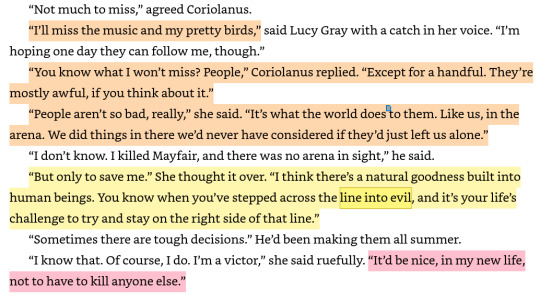
(Ballad, 495)
She's not naive. She recognizes the nuance that Rousseau does, that society shapes us. And Panem is pretty clearly a society led by people applying all the pressures they can think of on people toward evil. (And, after his heel turn, Coriolanus' is going to innovate some new pressures...) Clearly there are situations and circumstances that form us before we have much say in it, but that's not the same as being born evil.
The difference between inherent goodness and a corrupt society is, for Lucy Gray, a lot of hard work. It's a struggle. This repudiates both the version of "born evil" Coriolanus himself takes on, which relieves him of responsibility, and the self-righteous, Calvinist and/or ableist pov people keep arguing for, which makes "normal" people feel like they can be sure they're good (and ignore how we are all complicit in evil to some degree or another) because they have a "good" normal brain or they were just born so pure as a soul predestined for heaven. No, for her, everyone has to do the work. To her it's everyone's "life's challenge to try and stay on the right side of that line."
Even more pointedly, the love song she wrote him before his betrayal, "Pure as the Driven Snow," articulates her philosophy in the opening lines:

(Ballad, 481)
Again, we have her personal focus on the work of "staying on the right side" of good and evil after being born good into evil circumstances. She knows it hurts; she's led a hard life herself. "It's rough as a bair" to do that work, it's "like walkin' through fire." But it is doable.
Lucy Gray meant it as a love song but IMO "Pure as the Driven Snow" ends up a lament for the boy Coriolanus was and her love that he betrayed when he betrayed himself. And it is a direct rejection of his excuses, it is inadvertently reading him for filth for the lies he tells himself that all the world is the Games arena, all people are selfish and bad, and he isn't to blame for what he's done because he just wants to come out on top/be the victor of this "natural" "war of all against all" that is Gaul's philosophy (related to the Hobbes quote Collins begins with; I wrote a meta on that here) that he adopts.
I see her demeaned as a foolish girl who just "like bad boys" and I get so frustrated. I also get frustrated by the view that she must not have ever been sincere in loving or trusting him because IF SHE WAS then she would be a fool and his betrayal would somehow be her fault. And she'd reject the idea that she's "good" just because she's so pure or that anyone can claim we're good without doing a lot of hard work.

(Ballad, 482)
She is so thoughtful and interesting as a character. And she didn't just "like bad boys" - Coriolanus showed only his good side to her until the very end, once he'd decided to kill that part of himself. She had no way of knowing. Sometimes you trust someone and they betray you, it doesn't make you wrong, the shame is all theirs.
*Strict Calvinist predestination is some people are just predetermined to be bound for heaven and some for hell, some people are just born good and others are born bad. A lot of people in fandom seem to love Calvinism idk why. The ableism bit of this should be self-evident: there is no such thing as a "bad" brain type completely incapable of morality or a "good" brain and neurodivergence is not the source of all evil!
#lucy gray baird#thg meta#the ballad of songbirds and snakes#the hunger games#disagree with her if you want - but respect that her pov is philosophically sound and insightful#and i prefer the reading of the text where she's right and gaul and post heel turn coriolanus are wrong...#he could have kept trying to be good and loving for that girl#people dismissing her or being like 'she was constantly lying like a GIRLBOSS' is just so annoying - she's great as herself thank you#reject the idea that women are to blame for bad things people do#reject the idea that women are to blame for loving#that it must have been her fault somehow
134 notes
·
View notes
Text
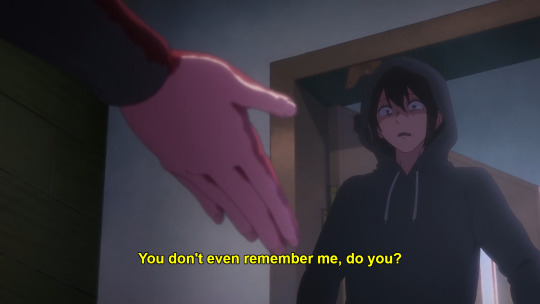

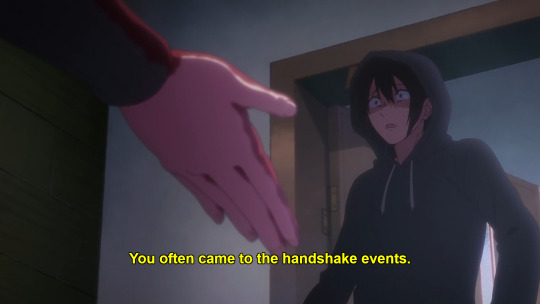
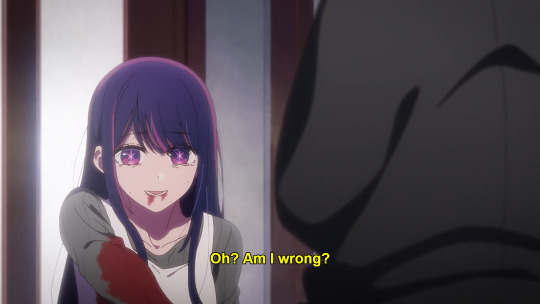
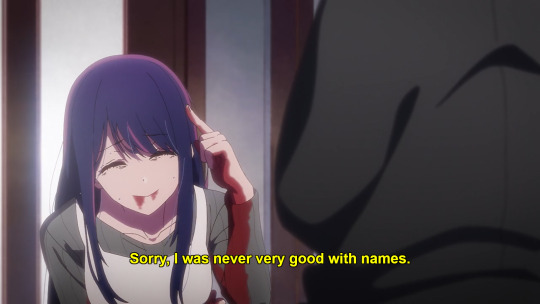
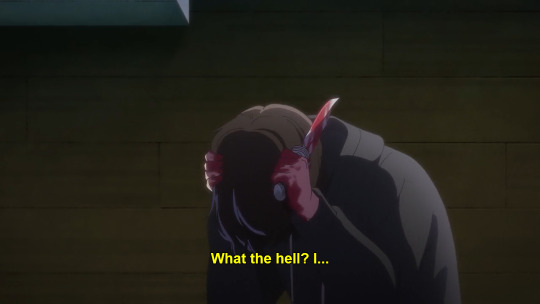
a friend and i were talking about this scene recently and she expressed a sense that it sat weirdly with her that ai remembered ryosuke, and felt that it went oddly with what OnK says about idol fandom - that it undermined the idea that ai did not owe these people any more than she already gave them, if that. i disagreed and couldn't quite put by finger on why but i think i managed to articulate why this works for me so well as we were talking.
ai's response here not only disarms ryosuke but it undermines and deconstructs any validity his rage might have had, on any level. to ryosuke, there is no nuance to this situation; if ai is not a pure, virginal flower eternally and exclusively dedicated to her fans to her own detriment then she must be a dirty, lying slut who was mocking them behind their backs when she even remembered they existed at all. it is pure white and black with no room for grey.
of course this isn't the case. but this is the dichotomy that the idol industry intentionally creates and perpetuates. it's why he can't handle it when ai shatters it.
i also think it's important to what OnK is challenging about the idol industry with this scene in particular that ryosuke is a fan who was 'close' enough to ai to be recognized - even years after they stopped seeing each other at handshake sessions. it means he was a particularly devoted fan, who was particularly all-in on the gachikoi kool-aid and with this exchange, OnK highlights that it's not just the idols being exploited by the industry; it's the fans, too.
ryosuke was also a victim of the idol industry, through obviously to a very different degree and in a very different context to ai. ryosuke is clearly not mentally well - like, genuinely, i don't mean that in a shitty glib way. he clearly is genuinely very mentally ill and vulnerable people like him are the ones most primed for the idol culture meat grinder. and he came out the other end having been turned into a monster.
no, ai does not owe him anything. but it is a testament to her pure, sincere kindness and a condemnation of ryosuke and the idol industry that created him, that she remembered him and thought fondly of him all the same. and that kindness and nuance is so incompatible with the world the industry created in ryosuke's mind that he would literally rather kill himself that reconcile them.
50 notes
·
View notes
Text
This post has been a long time coming and will be pretty long, so let's get into it.
Nuance in Syscourse
And cw we will be talking about a lot of common syscourse arguments as examples, so if that is not something you are comfortable reading, this is not the post for you. This includes mentions of fakeclaiming.
We see a lot of "all in this group believe/do this." If you use the word all in any arguments like this, what follows is likely untrue as(and this is an exception lol) all people are unique. Also, it is important to be aware of the flaws that exist on your side of syscourse instead of just focusing on the flaws of the other side. And we won't be talking about neutral's beliefs because they are even more complex and varied, but this post can be used as justification for why neutrals exist.
So firstly, "all anti-endos believe endos don't/can't exist" very much false. I know of anti-endos who believe endogenics exist, and I know of pro-endos who don't believe endos exist. That has never been where the line is, and it never will be. There are enough other factors present that people can make their decisions on other than that alone.
Common arguments of this might be from a pro-endo I don't think endos exist, but they deserve to be respected and allowed to discover more about themselves at their own pace. And for anti-endos I believe endos exist I just simply don't think they belong in CDD spaces, and I don't feel their experience is close enough to mine that I feel comfortable interacting. They don't have to fit your definition of a pro or anti endo to identify as such. They choose the syscourse label they think fits them best.
Of course, there are other more harmful beliefs, such as the anti-endo belief that endos are plural they just don't remember their trauma. This does happen in some cases, so it isn't completely out of left field, but it is another case where anti-endos aren't falling into the immediate their faking mentality. It is also fair to say that some traumagenics who believe themself to be endogenic may have a harder time recognizing their trauma/trauma responses when they start becoming more prominent due to the label. This by no means is an excuse not to take the label if it is what you feel best represents you but simply a possible consequence of it. You're identity us what feels right to you, and it can change as you discover more about yourself.
Both sides of syscourse can also justify that some on the opposing side are abelist. Both sides do abelist nonsense all the time. Anti-endos won't stop throwing other disorders under the bus, and both sides won't stop spreading misinformation about CDDs. Endogenics don't need to be validated by the DSM or ICD to exist. The writers of diagnostic manuals for disorders do not care about including non-disordered experiences. Endos weren't even slightly on their radar when they were writing it. Stop making the diagnostic manuals about something they simply aren't about, please.
Another thing that complicates things is that everyone has a different definition of what trauma is, and everyone's threshold for trauma is different. It's easy for those other than the person in question to look at their experiences and think well that would have traumatized me even if they don't find it traumatizing they must have been traumatized by it. It's also easy for those who have experienced trauma to dismiss their experiences as "not that bad" when they really were. There is no solid line to go off of for what really does qualify, which can lead to confusion. Two systems could have the exact same experiences, and one would be/identify as traumagenic and the other endogenic. It's all a matter of perspective.
There is also the problem that many of those with CDDs first introduction to endos is that they are claiming to have CDDs. That can be very scary for someone discovering their disorder/the community and struggling to find the resources they need for their disorder. It is not surprising that those with CDDs who think that's what endos are would want to keep their distance and may take on a label based on what their friends are labeling themselves. That doesn't make them a bad person, just misinformed.
There are also pro and anti harassment people on all sides of syscourse. There are pro-endos who go out of their way to harass and retraumatize anti-endos and there are anti-endos who go out of their way to try to stop (pro)endos from being harassed. You can't tell how aggressive someone will be based on their syscourse stance. This also happens between people on the same side of syscourse. Pro-harassment anti and pro endos harass anti-harassment people on their same side all the time.
If you aren't willing to talk to people you disagree with you, you should not speak on what they believe with any sort of authority. This doesn't need to be some all-out us vs. them brawl. People are allowed to learn and grow and change over time, but treating them terribly will never help them do so and can actively stop them from doing so. If someone harasses you, you can block them. But that is a problem with that person, not every person who labels themselves the same way. No one in syscourse is a monolith and should not be treated as such. Block the ones you don't like or who don't like you, but you don't need to use their actions against their entire community.
14 notes
·
View notes